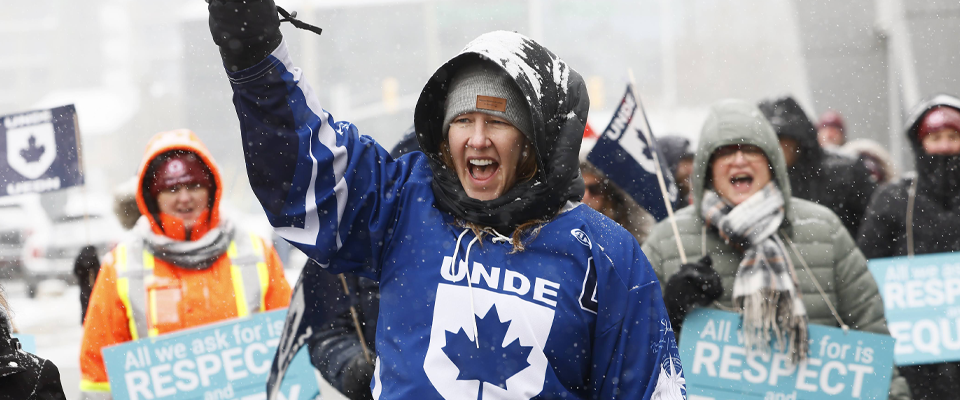The following op-ed by UNDE National President June Winger was published by the Ottawa Citizen on April 1, 2024.
Imagine you’re part of a team that is crucial to keeping our military’s morale high and their families supported. You run programs that keep them fit, manage stores where they shop, and you’re there — day in and day out — ensuring they have what they need. Now, imagine being told repeatedly your hard work is valued, but you just won’t be fairly compensated for it.
This is what’s at the centre of the standoff between Canadian Forces Morale and Welfare Services (CFMWS) and more than 500 workers in Bagotville, Kingston, Montreal-St. Jean, Ottawa, Petawawa and Valcartier, who have been on the picket lines for more than two months.
CFMWS CEO Ian Poulter recently put out a letter with a “heartfelt call for understanding,” in which he talked about dedication and support for military families. But he seems to have forgotten who makes that all possible: the workers.
Poulter paints a picture of an unavoidable situation, where services to military families are being cut left and right because of the strike. But these workers aren’t on strike because they want to be; they’re on strike because they feel pushed into a corner, fighting for fair pay as the lowest-paid federal public service workers in the country.
CFMWS workers are mostly women, military spouses and veterans. They are already earning about half of what their colleagues earn, yet they’re being offered a mere four- per-cent-per-year pay increase. That’s not only below the Public Interest Commission‘s recommendation of 4.75 per cent, but also significantly less than the 6.8-per-cent bump higher-paid employees received last year. It’s not about wanting special treatment, it’s about demanding the same level of respect given to others. After all, don’t we all pay the same for our groceries and utilities?
The financial health of each military base — and by extension the broader military community — depends on fair treatment of all workers.
This is more than a strike. It’s a fight for respect, dignity, and recognition for the workers behind the services.
Striking workers have clearly said, “enough is enough.” If Poulter truly values the community CFMWS serves, he needs to start valuing those who make it all possible. At the end of the day, it’s not just programs and services that are at stake — it’s people. Workers who barely make minimum wage and are facing severe financial strain, with some even resorting to food banks.
The ball is in his court. Will he make a move towards understanding, negotiation and resolution, or will the impasse deepen, further straining the support for our troops and their families? The outcome will clearly show us whether the commitment to those who serve also extends to those doing the serving.
June Winger is the national president of the Union of National Defence Employees, which is a component union of the Public Service Alliance of Canada, representing more than 20,000 public and private sector workers at the Department of National Defence — including more than 500 striking CFMWS workers.
 Member Login
Member Login



